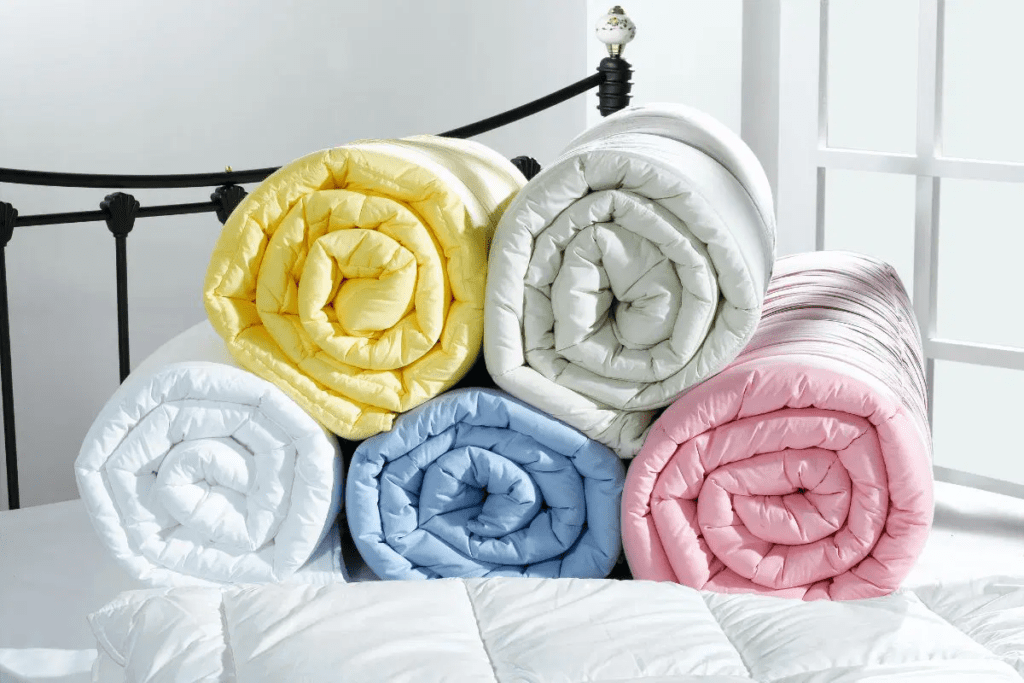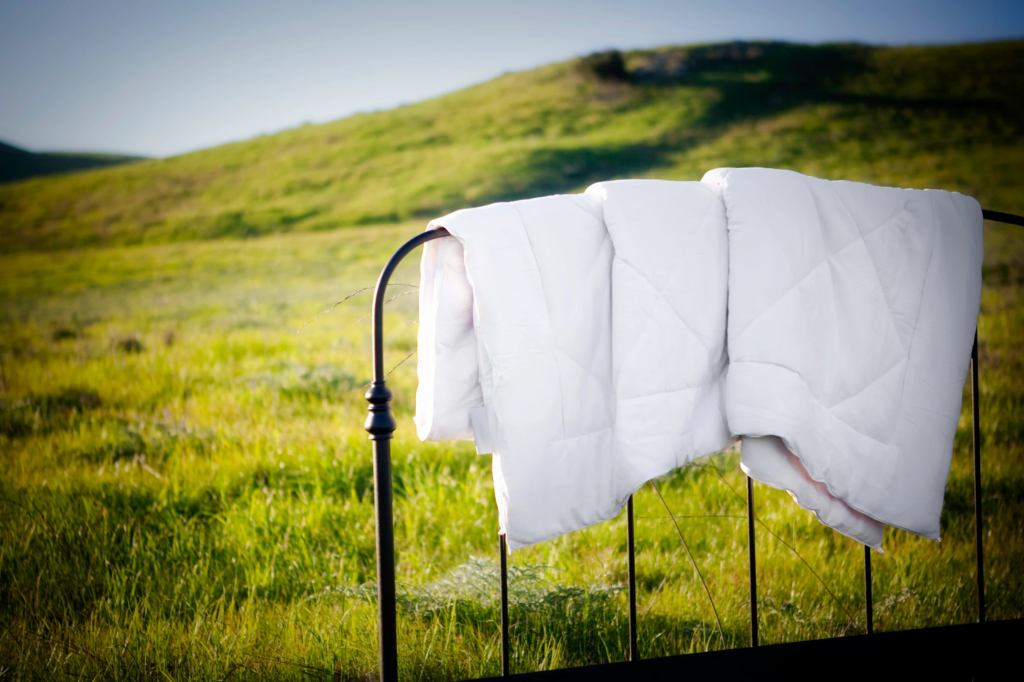In a world where eco-consciousness meets luxury, bamboo comforters are gaining popularity as an ethical choice for those who value both environmental impact and premium comfort. This innovative bedding option exemplifies the fusion of sustainability and indulgence, appealing to consumers who seek high-quality home goods that are as gentle on the planet as they are comfortable.
Bamboo fibers, renowned for their softness and resilience, bring a breathable, natural quality to bedding, making these comforters ideal for every season. Their temperature-regulating properties allow them to keep sleepers cozy in the winter and cool in the summer, creating a versatile, single-layer solution. Hypoallergenic by nature, bamboo comforters also benefit those with sensitive skin or allergies, offering a hygienic option that minimizes allergens and dust.
With bamboo’s inherent durability, these comforters maintain their softness and quality through years of use, supporting the sustainable ethos behind them. By choosing bamboo, consumers can enjoy a luxurious, long-lasting product while reducing their environmental footprint—a true testament to eco-friendly luxury.

As awareness of environmental impact grows, bamboo comforters have emerged as a notable example of how eco-friendly practices and luxury can converge in the bedding industry. These comforters exemplify how an ethical approach to manufacturing, sourcing, and educating consumers can turn an ordinary item into a sustainable product that not only serves a functional purpose but also makes a positive environmental impact. While bamboo comforters represent a promising direction for bedding, there is still ample opportunity for innovation and improvement to ensure these products remain environmentally friendly from production to disposal. By focusing on material innovation, ethical sourcing, energy-efficient manufacturing, and consumer education, the bedding industry can build a sustainable future with bamboo comforters at the forefront. Here is a detailed exploration of the potential pathways for truly sustainable bedding solutions.
Material Innovation: Beyond Bamboo Fibers
The materials used in bedding products are the foundation of their environmental impact. Bamboo fibers offer an excellent starting point, as they are naturally renewable and require fewer resources to grow compared to conventional cotton. Yet, true material innovation lies in enhancing every component of the product, ensuring that each layer—be it the fill, outer fabric, or stitching—reflects a sustainable approach.
- Biodegradable Fillings: Most comforters rely on synthetic polyester fillings derived from petroleum. Switching to biodegradable materials, such as organic cotton or wool, offers a better alternative that decomposes naturally without leaving a lasting environmental footprint. For instance, Tencel, a fiber made from sustainably-sourced wood pulp, combines a luxurious feel with strong eco-credentials. Similarly, kapok, a fiber derived from the seed pods of the kapok tree, offers a naturally buoyant and biodegradable filling that can provide structure and warmth without synthetic fibers.
- Recycled Content: Incorporating recycled polyester, particularly from post-consumer plastic waste, can offer a more eco-friendly option for filling while still providing insulation and resilience. Brands like Patagonia and The North Face have successfully integrated recycled polyester into their products, showcasing how bedding companies could do the same by utilizing materials already in circulation, thus reducing the need for virgin resources.
- Sustainable Dyes and Printing Techniques: The dyeing and printing processes in textiles contribute significantly to water pollution and resource consumption. Bamboo bedding can benefit from natural, low-impact dyes made from plants or even waste materials, such as onion skins or coffee grounds, which provide a range of colors without the need for harsh chemicals. Waterless dyeing technologies, such as supercritical carbon dioxide dyeing, also present a promising avenue to significantly cut down on water usage and chemical runoff.
Ethical Sourcing: Transparent Supply Chains and Fair Labor Practices
The globalized nature of textile production means that products often travel across multiple countries and involve numerous parties from raw material extraction to final product assembly. Ethical sourcing goes beyond the origin of raw materials; it also includes the human impact of production practices and the transparency of the supply chain.
- Fair Trade Practices: The Fair Trade certification ensures that farmers and workers involved in the production process receive fair wages and work in safe conditions. While Fair Trade certification has primarily been applied to food products, textiles are increasingly becoming certified as well. By integrating fair trade practices, bamboo bedding manufacturers can ensure that the people behind the product are compensated fairly and work under humane conditions, fostering positive socioeconomic impacts in communities where bamboo or other materials are sourced.
- Traceability and Transparency: Implementing traceability measures allows companies to verify the origin and quality of their materials while offering consumers visibility into the journey of their products. With the advent of blockchain technology, textile companies can integrate transparent supply chains that track materials from sourcing to manufacturing, providing a secure record of each step in the process. This transparency not only builds trust but also allows for accountability, as any potential environmental or social issues can be traced to their origin.
- Animal Welfare: Although bamboo comforters are plant-based, other bedding materials often rely on animal-derived products, such as wool or down feathers. If these materials are used, it is essential to ensure they come from sources that prioritize animal welfare. Certifications such as the Responsible Wool Standard or Responsible Down Standard provide assurance that animals are treated humanely and ethically. This commitment to ethical sourcing extends to minimizing harm to animals and ensuring their well-being within the production process.

Energy-Efficient Manufacturing: Reducing the Carbon Footprint of Production
The manufacturing phase is where most environmental impact occurs, due to energy consumption, water usage, and waste production. Energy-efficient manufacturing can mitigate these effects, bringing the industry closer to achieving net-zero carbon emissions.
- Renewable Energy in Production Facilities: Integrating renewable energy sources, such as solar, wind, or hydroelectric power, into production processes reduces dependency on fossil fuels and can significantly lower a company’s carbon footprint. Facilities powered by renewable energy also tend to reduce operational costs over time, supporting sustainable growth and resilience in the long run. Companies can work with local governments and renewable energy providers to install solar panels, wind turbines, or other sources of clean energy in their manufacturing plants.
- Water Conservation and Closed-Loop Systems: Water scarcity is a growing concern, especially in textile-producing regions. Closed-loop water systems, which recycle water within the manufacturing process, can cut down on water use and prevent wastewater from polluting nearby ecosystems. Companies can also explore water-saving techniques such as using air-dry rather than water-dry machinery or integrating more efficient washing systems that use less water per cycle. For bamboo textiles specifically, employing mechanical rather than chemical processing methods preserves both water and the integrity of the fibers.
- Waste Reduction and Recycling Programs: Sustainable manufacturing also requires minimizing waste and making use of byproducts. Textile waste from cutting and trimming can be repurposed, recycled, or composted, depending on the material. For bamboo comforters, manufacturers can implement zero-waste policies by using fabric scraps for secondary products like pillow stuffing, insulation, or packaging fillers. Recycling programs within production facilities can ensure that any unavoidable waste is reprocessed or safely disposed of, reducing the overall impact on landfills.
Consumer Education: Empowering Consumers with Knowledge and Transparency
The success of sustainable products depends largely on consumer awareness. By educating buyers about the environmental benefits of bamboo comforters and providing transparent information about their sourcing and production processes, companies can foster a more informed customer base that values eco-friendly choices.
- Product Labeling and Certifications: Certifications like OEKO-TEX, GOTS (Global Organic Textile Standard), and Fair Trade provide an official endorsement of a product’s sustainability, enabling consumers to make environmentally conscious choices with confidence. Clear labeling that includes these certifications, along with information about materials, origin, and manufacturing practices, helps consumers understand the impact of their purchases.
- Life Cycle Assessments and Carbon Footprint: Conducting life cycle assessments (LCAs) on products can help companies communicate their environmental impact more accurately. LCAs evaluate each stage of a product’s life, from raw material extraction to disposal, providing a comprehensive look at its ecological footprint. Companies can use this data to improve production processes and offer customers insights into the impact of their purchase decisions. For example, highlighting the carbon savings associated with choosing bamboo comforters over traditional cotton ones can underscore the environmental benefits.
- Consumer Awareness Campaigns: Marketing and awareness campaigns that focus on the benefits of bamboo comforters, such as hypoallergenic properties, temperature regulation, and eco-friendliness, can help consumers appreciate the value of sustainable bedding. Through storytelling, companies can showcase the journey of bamboo—from plant to comforter—emphasizing the care and responsibility taken at each step. Social media platforms, blogs, and eco-focused partnerships can spread the word and build a community of consumers dedicated to supporting sustainable brands.
A Vision for the Future of Sustainable Bedding
Looking forward, bamboo comforters can lead the bedding industry toward a future where luxury and sustainability coexist harmoniously. The path to achieving this vision involves continuous improvements and a commitment to eco-friendly practices in every aspect of the product’s lifecycle. Here are key strategies that can support this evolution:
- Research and Development: Continued research into biodegradable materials, natural dyeing processes, and resource-efficient production methods can enhance the eco-credentials of bamboo comforters. Companies can partner with universities, environmental organizations, and innovation hubs to develop groundbreaking materials and techniques.
- Collaborations for a Circular Economy: By working with recycling facilities, waste management companies, and other manufacturers, bedding companies can create a circular economy that minimizes waste. For instance, partnerships with garment recyclers can ensure that returned or unused comforters are repurposed, reducing the need for virgin resources.
- Enhanced Customer Engagement: Offering end-of-life solutions, such as recycling programs or take-back initiatives, can help extend the product lifecycle and promote circularity. For example, customers could return their old comforters to the manufacturer, who would then process them into new products or recycle their materials.
The Future of Eco-Conscious Luxury
In summary, the sustainable transformation of bamboo comforters goes beyond their use of eco-friendly materials. It encompasses a holistic approach to responsible manufacturing, ethical sourcing, and consumer engagement, with each step reinforcing the product’s commitment to sustainability. As the industry continues to evolve, bamboo comforters serve as an inspiring example of how high-quality, luxurious bedding can support a greener future.
The bedding industry’s shift toward sustainable practices is both a response to consumer demand and an ethical imperative, with bamboo comforters leading the way as a versatile, eco-conscious choice. By investing in material innovation, ethical sourcing, energy-efficient manufacturing, and consumer education, the future of sustainable bedding promises not only comfort and quality but also a meaningful contribution to environmental preservation and social responsibility.
Related Content
- 1pc 100% Bamboo Fiber Waterproof Mattress Protector (250gsm), Cooling And Breathable Knitted Mattress Pad Cover, 3D Air Bed Cover For Cozy Sleep
- 3-Pack Eco-Friendly Bamboo Fiber Dishwashing Scrubbers, Natural Uncharged Kitchen Cleaning Sponges, Multipurpose Household Scrub Pads for Pot, Pan & Dish Cleaning
- 100pcs Sustainable Cotton Swabs With Bamboo Sticks – Double-Tipped, Disposable For Makeup Removal & Ear Cleaning
- Eco-Friendly Bamboo Fiber Paper Cups 8OZ, High Temperature Resistant, 400-Pack, Biodegradable Unbleached Cups for Hot and Cold Beverages, Multipurpose Use for Christmas, Halloween, Easter, Hanukkah, Thanksgiving – Hand Wash Only
- 400pcs Sustainable Bamboo Cotton Swabs – Dual-Tip, Plastic-Free, 100% Natural Cotton Buds For Makeup & Cleaning – Kraft Paper Storage Box
- Eco-Friendly Bamboo Fiber Cleaning Balls: Suitable for Kitchen, Bathroom, And Toilet – No Electricity Required
- Luxury Bamboo Sheets for Hot Sleepers
- Luxury bamboo bedding sets
- Bella Lux Sheets – Petit Bella – Bella Notte Linens
